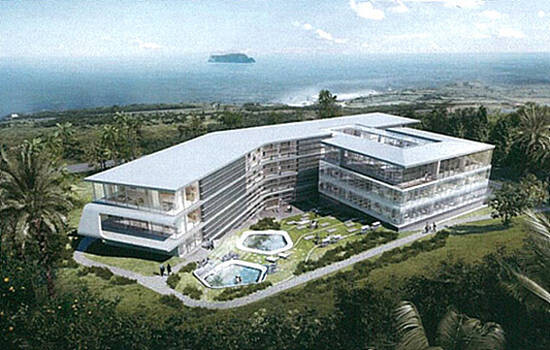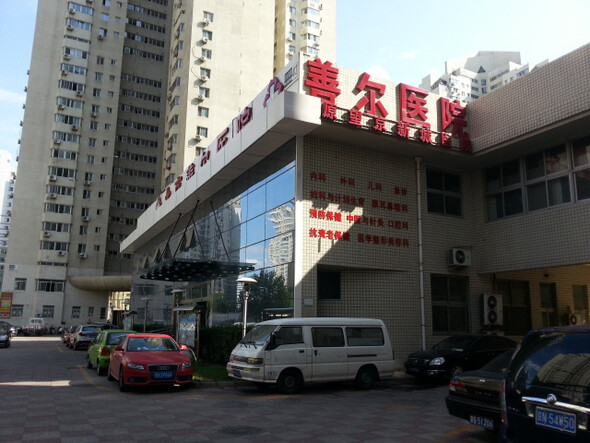hankyoreh
Links to other country sites 다른 나라 사이트 링크
Chinese for-profit hospital rejected in Jeju Island

By Kim Yang-joong, medical correspondent
The South Korean government has rejected Chinese company CSC’s application to open a for-profit hospital on Jeju Island.
The decision comes after revelations about approval process irregularities - including a failure to conduct basic investor suitability screenings - for the foreign for-profit hospitals announced as a key component of the administration “seven most promising services” at a trade and investment promotion council meeting presided over by President Park Geun-hye on Aug. 12. Many are now accusing the officials in question of a lack of due diligence in pushing the policy.
The Ministry of Health and Welfare announced on Sept. 15 that it had decided not to approve CSC’s project proposal for San’er Hospital after examining the results of an on-site survey of the company by the South Korean embassy in China and a supplementary plan submitted by Jeju Special Self-Governing Province.
The reasons given by the ministry were threefold. First, it ruled CSC as an “unsuitable investor” for a for-profit hospital in Jeju because of its financial problems and the arrest of the parent company president. Second, the ministry cited the failure to address inadequacies with the emergency treatment system - one of the main issues when the approval was first held up in Aug. 2013. Indeed, an Oct. 2013 memorandum of understanding between San’er Hospital and a local Jeju hospital to address emergency situations was recently dissolved.
Third, the ministry pointed to the lack of any plan for the province’s continued monitoring of stem cell operations, which had been removed from CSC’s project proposal. The issue of illegal stem cell operations had been another reason for the Aug. 2013 approval postponement.
In previous Hankyoreh reports, visits to a San’er Hospital branch opened by CSC in China confirmed its focus on stem cell treatments, and local press reports were cited on the arrest of the parent company’s president. The details were later confirmed by the embassy’s on-site examination.
The ministry said it referred Jeju Province in Oct. 2013 to Chinese press reports about corruption by the parent company president, to which the province responded that its “examination showed no issues.”
The ministry now plans to give the province word shortly on its decision to reject the project. But it also said it plans to continue pushing for increased health care investment in Jeju and the country’s Free Economic Zones, including bids for foreign for-profit hospitals.
Many see the Jeju hospital’s approval - something reported directly to President Park - as a “dog-and-pony show” that succeeded only in fanning the public’s concerns. Government officials are now facing criticism that their reckless pursuit of “big fish” has led them to hastily approve the opening of for-profit hospitals that stand to raise medical costs and endanger the foundations of the South Korean health care system.
“The Ministry of Health and Welfare is citing [the hospital plan] as one of the key issues for the trade and investment promotion council, even though it knew the investor was behind bars for real estate fraud and the Chinese parent company’s ability to invest was unclear. That is an act of deception against the South Korean public,” said Woo Seok-gyun, policy committee chief for the Korean Federation of Medical Groups for Health Rights.
“The Minister of Health and Welfare [Moon Hyung-pyo] was taken in by the economic ministries’ emphasis on ’industrialization,‘” Woo added. “He should step down over this.”
Jeju National University medical school professor Park Hyung-geun said the administration’s decision was “motivated by concerns that if it approved the opening of a San’er Hospital in Jeju, it could hurt the public’s perceptions of for-profit hospitals, and those effects might spill over to health care investment promotion policy in general.”
“Now that this has happened, we need to reconsider or drop not just the for-profit hospitals, which stand to increase medical costs, but other investment promotion policies too, such as allowing hospitals to set up their own for-profit corporations,” Park argued.

Please direct questions or comments to [english@hani.co.kr]

Editorial・opinion
![[Column] Has Korea, too, crossed the Rubicon on China? [Column] Has Korea, too, crossed the Rubicon on China?](https://flexible.img.hani.co.kr/flexible/normal/500/300/imgdb/original/2024/0419/9317135153409185.jpg) [Column] Has Korea, too, crossed the Rubicon on China?
[Column] Has Korea, too, crossed the Rubicon on China?![[Correspondent’s column] In Japan’s alliance with US, echoes of its past alliances with UK [Correspondent’s column] In Japan’s alliance with US, echoes of its past alliances with UK](https://flexible.img.hani.co.kr/flexible/normal/500/300/imgdb/original/2024/0419/2317135166563519.jpg) [Correspondent’s column] In Japan’s alliance with US, echoes of its past alliances with UK
[Correspondent’s column] In Japan’s alliance with US, echoes of its past alliances with UK- [Editorial] Does Yoon think the Korean public is wrong?
- [Editorial] As it bolsters its alliance with US, Japan must be accountable for past
- [Guest essay] Amending the Constitution is Yoon’s key to leaving office in public’s good graces
- [Editorial] 10 years on, lessons of Sewol tragedy must never be forgotten
- [Column] A death blow to Korea’s prosecutor politics
- [Correspondent’s column] The US and the end of Japanese pacifism
- [Guest essay] How Korea turned its trainee doctors into monsters
- [Guest essay] As someone who helped forge Seoul-Moscow ties, their status today troubles me
Most viewed articles
- 1[Column] The clock is ticking for Korea’s first lady
- 2Samsung barricades office as unionized workers strike for better conditions
- 3After 2 months of delayed, denied medical care, Koreans worry worst may be yet to come
- 4[Correspondent’s column] In Japan’s alliance with US, echoes of its past alliances with UK
- 5[Column] Has Korea, too, crossed the Rubicon on China?
- 6Hong Se-hwa, voice for tolerance whose memoir of exile touched a chord, dies at 76
- 7All eyes on Xiaomi after it pulls off EV that Apple couldn’t
- 8US overtakes China as Korea’s top export market, prompting trade sanction jitters
- 9[Photo] Smile ambassador, you’re on camera
- 10[Guest essay] How Korea turned its trainee doctors into monsters